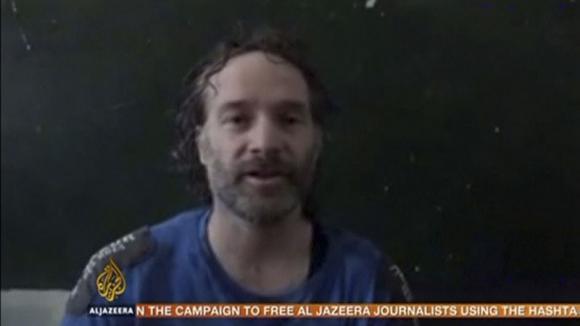American journalist Peter Theo Curtis is shown in this undated still frame taken from video courtesy of Al Jazeera on August 24, 2014.
Less than a week after the killing of American journalist James Foley by ISIS militants, another abducted US writer has been freed from captivity.
Peter Theo Curtis was held hostage by Jabhat al-Nusra, the al-Qaeda branch in Syria. He was unexpectedly released Sunday after nearly two years as a hostage. While many questions remain about Curtis’ experience and the terms of his release, friends and family are expressing joy and gratitude at the news of his freedom.
“My heart is full at the extraordinary, dedicated, incredible people, too many to name individually, who have become my friends and have tirelessly helped us over these many months,” said Curtis’ mother, Nancy Curtis, in a family statement. “My entire focus right now is on helping the other families of those still being held in Syria, and on taking care of my son.”
Journalist and author Jennifer Steil was Curtis’ high school sweetheart, and she’s a lifelong friend of the now-released writer. She, too, describes feelings of “immense relief” and “overwhelming gratitude” that Curtis is not only alive, but also free.
“The horror that happened to James Foley exacerbated everyone’s worry about Theo,” Steil says. “I feel mostly for his family, and for his mother. As a parent, I just can’t imagine anything worse than not knowing what has become of your child. So my heartache has mostly been for his mother and his family, who have been working so unbelievably hard to find him.”
Steil describes Curtis as a “high school mischief-maker” turned “fine intellect.” Curtis earned a doctorate in comparative literature from the University of Massachusetts at Amherst. He also wrote two books, and his writing and freelance journalism work took him to Yemen, Turkey and eventually Syria, where he was captured.
“He’s a brilliant linguist. He speaks beautiful Arabic," Steil says. "He speaks several other languages fluently — French, German, I think even Russian. He’s fearless. He has no sense of embarrassment.”
In June 2006, Curtis invited Steil to Yemen to help train the staff of a small English-language newspaper called the YemenObserver.
“When I expressed concern for the security situation over there, he said ‘Oh, the US State Department exaggerates,'" Steil remembers. "'Everything is totally safe in Yemen, and you’re in much greater danger of dying in an automobile accident than you are in a terrorist attack.’”
Steil traveled to Sana’a and taught a three-week journalism training course. Soon thereafter she accepted an offer to become editor-in-chief of the paper.
“[Theo] inspired me in that he invited me to come to Yemen, which is not a place I ever would have gone had he not encouraged me to go there. He actually came to New York and spent time over a beer convincing me that this was a wise decision to make with my life," she says.
"And once I was in Yemen, his ease at the culture inspired me to learn Arabic, to learn as much as I could about Yemen, to integrate myself with the people. And in all those ways he inspired me. I wouldn’t be anywhere I am now without his encouragement.”
We want to hear your feedback so we can keep improving our website, theworld.org. Please fill out this quick survey and let us know your thoughts (your answers will be anonymous). Thanks for your time!
